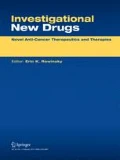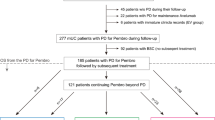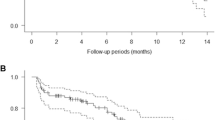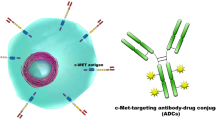Summary
There are two highly selective antibodies to the epidermal growth factor receptor (EGFR) now available for use in metastatic colorectal cancer (mCRC). In KRAS wild type patients, cetuximab (Cmab)-an IgG1 chimeric molecule—has activity alone and in combination with chemotherapy for the first, second and third-line settings. Panitumumab (Pmab)-a fully humanized IgG2 molecule-has activity as a single agent in chemorefractory mCRC and shows promising activity in combination with chemotherapy. It remains unclear which antibody to use. This retrospective review of our experience with Pmab in 13 EGFR antibody-naive patients and in 22 patients previously treated with Cmab for mCRC highlights a lack of hypersensitivity reactions (HSR) with Pmab, even in patients who experienced HSR to Cmab. In patients who received Cmab, 22% developed grade 3–4 HSR. There were no HSR on subsequent treatment with Pmab. We demonstrate similar activity in 95% of cases, between Cmab and Pmab both alone and in combination with chemotherapy in the treatment of mCRC. In one case we report unique sensitivity to Pmab after progression with Cmab.

Similar content being viewed by others
References
Bokemeyer C, Bondarenko I, Makhson A et al (2008) Fluorouracil, Leucovorin, and Oxaliplatin with and without Cetuximab in the first-line treatment of metastatic colorectal cancer. J Clin Oncol 29:29
Rougier P, Stroiakovski D, Köhne C et al (2009) Addition of cetuximab to FOLFIRI in first-line metastatic colorectal cancer (mCRC): Updated survival data and influence of KRAS status on outcome in the CRYSTAL study. American Society of Clinical Oncology-Gastrointestinal Cancer Symposium, Abstract # 443
Jonker DJ, O’Callaghan CJ, Karapetis CS et al (2007) Cetuximab for the treatment of colorectal cancer. N Engl J Med 357:2040–2048. doi:10.1056/NEJMoa071834
Cunningham D, Humblet Y, Siena S et al (2004) Cetuximab monotherapy and cetuximab plus irinotecan in irinotecan-refractory metastatic colorectal cancer. N Engl J Med 351:337–345. doi:10.1056/NEJMoa033025
Folprecht G, Lutz MP, Schoffski P et al (2006) Cetuximab and irinotecan/5-fluorouracil/folinic acid is a safe combination for the first-line treatment of patients with epidermal growth factor receptor expressing metastatic colorectal carcinoma. Ann Oncol 17:450–456. doi:10.1093/annonc/mdj084
Saltz LB, Meropol NJ, Loehrer PJ Sr et al (2004) Phase II trial of cetuximab in patients with refractory colorectal cancer that expresses the epidermal growth factor receptor. J Clin Oncol 22:1201–1208. doi:10.1200/JCO.2004.10.182
Tabernero J, Van Cutsem E, Diaz-Rubio E et al (2007) Phase II trial of cetuximab in combination with fluorouracil, leucovorin, and oxaliplatin in the first-line treatment of metastatic colorectal cancer. J Clin Oncol 25:5225–5232. doi:10.1200/JCO.2007.13.2183
Cervantes A, Casado E, Van Cutsem E (2005) Cetuximab plus oxaliplatin/5-fluorouracil (5-FU)/folinic acid (FA) (FOLFOX-4) for the epidermal growth factor receptor (EGFR)-expressing metastatic colorectal cancer (mCRC) in the first-line setting: a phase II study. Eur J Cancer Suppl 3:181–182
Wilke H, Glynne-Jones R, Thaler J et al (2008) Cetuximab Plus Irinotecan in Heavily Pretreated Metastatic Colorectal Cancer Progressing on Irinotecan: MABEL Study. J Clin Oncol 26:5335–5343. doi:10.1200/JCO.2008.16.3758
Sobrero AF, Maurel J, Fehrenbacher L et al (2008) EPIC: phase III trial of cetuximab plus irinotecan after fluoropyrimidine and oxaliplatin failure in patients with metastatic colorectal cancer. J Clin Oncol 26:2311–2319. doi:10.1200/JCO.2007.13.1193
Van Cutsem E, Peeters M, Siena S et al (2007) Open-label phase III trial of panitumumab plus best supportive care compared with best supportive care alone in patients with chemotherapy-refractory metastatic colorectal cancer. J Clin Oncol 25:1658–1664. doi:10.1200/JCO.2006.08.1620
Berlin J, Posey J, Tchekmedyian S et al (2007) Panitumumab with irinotecan/leucovorin/5-fluorouracil for first-line treatment of metastatic colorectal cancer. Clin Colorectal Cancer 6:427–432. doi:10.3816/CCC.2007.n.011
Mano M, Humblet Y (2008) Drug Insight: panitumumab, a human EGFR-targeted monoclonal antibody with promising clinical activity in colorectal cancer. Nat Clin Pract Oncol 5:415–425. doi:10.1038/ncponc1136
Chung KY, Shia J, Kemeny NE et al (2005) Cetuximab shows activity in colorectal cancer patients with tumors that do not express the epidermal growth factor receptor by immunohistochemistry. J Clin Oncol 23:1803–1810. doi:10.1200/JCO.2005.08.037
Milano G, Etienne-Grimaldi MC, Dahan L et al (2008) Epidermal growth factor receptor (EGFR) status and K-Ras mutations in colorectal cancer. Ann Oncol 19:2033–2038. doi:10.1093/annonc/mdn416
Bokemeyer C, Bondarenko I, Hartmann JT et al (2008) KRAS status and efficacy of first-line treatment of patients with metastatic colorectal cancer (mCRC) with FOLFOX with or without cetuximab: the OPUS experience. J Clin Oncol 26:4000
Karapetis CS, Khambata-Ford S, Jonker DJ et al (2008) K-ras mutations and benefit from cetuximab in advanced colorectal cancer. N Engl J Med 359:1757–1765. doi:10.1056/NEJMoa0804385
Lievre A, Bachet JB, Boige V et al (2008) KRAS mutations as an independent prognostic factor in patients with advanced colorectal cancer treated with cetuximab. J Clin Oncol 26:374–379. doi:10.1200/JCO.2007.12.5906
Lievre A, Bachet JB, Le Corre D et al (2006) KRAS mutation status is predictive of response to cetuximab therapy in colorectal cancer. Cancer Res 66:3992–3995. doi:10.1158/0008-5472.CAN-06-0191
Van Cutsem E, Lang I, D'haens G et al (2008) KRAS status and efficacy in the first-line treatment of patients with metastatic colorectal cancer (mCRC) treated with FOLFIRI with or without cetuximab: The CRYSTAL experience. J Clin Oncol 26:2
Amado RG, Wolf M, Peeters M et al (2008) Wild-type KRAS is required for panitumumab efficacy in patients with metastatic colorectal cancer. J Clin Oncol 26:1626–1634. doi:10.1200/JCO.2007.14.7116
De Roock W, Piessevaux H, De Schutter J et al (2008) KRAS wild-type state predicts survival and is associated to early radiological response in metastatic colorectal cancer treated with cetuximab. Ann Oncol 19:508–515. doi:10.1093/annonc/mdm496
Khambata-Ford S, Garrett CR, Meropol NJ et al (2007) Expression of epiregulin and amphiregulin and K-ras mutation status predict disease control in metastatic colorectal cancer patients treated with cetuximab. J Clin Oncol 25:3230–3237. doi:10.1200/JCO.2006.10.5437
Di Nicolantonio F, Martini M, Molinari F et al (2008) Wild-type BRAF is required for response to panitumumab or cetuximab in metastatic colorectal cancer. J Clin Oncol 10:10
Helbling D, Borner M (2007) Successful challenge with the fully human EGFR antibody panitumumab following an infusion reaction with the chimeric EGFR antibody cetuximab. Ann Oncol 18:963–964. doi:10.1093/annonc/mdm130
Langerak A, River G, Mitchell E et al (2009) Panitumumab monotherapy in patients with metastatic colorectal cancer and cetuximab infusion reactions: a series of four case reports. Clin Colorectal Cancer 8:49–54. doi:10.3816/CCC.2009.n.008
Saif MW, Peccerillo J, Potter V (2008) Successful re-challenge with panitumumab in patients who developed hypersensitivity reactions to cetuximab: report of three cases and review of literature. Cancer Chemother Pharmacol 10:10
Miller AB, Hoogstraten B, Staquet M, Winkler A (1981) Reporting results of cancer treatment. Cancer 47:207–214. doi:10.1002/1097-0142(19810101)47:1<207::AID-CNCR2820470134>3.0.CO;2-6
Hecht JR, Mitchell E, Chidiac T et al (2008) A randomized phase IIIB Trial of chemotherapy, bevacizumab, and panitumumab compared with chemotherapy and bevacizumab alone for metastatic colorectal cancer. J Clin Oncol 29:29
Tol J, Koopman M, Cats A et al (2009) Chemotherapy, bevacizumab, and cetuximab in metastatic colorectal cancer. N Engl J Med 360:563–572. doi:10.1056/NEJMoa0808268
Pfeiffer P, Nielsen D, Yilmaz M et al (2007) Cetuximab and irinotecan as third line therapy in patients with advanced colorectal cancer after failure of irinotecan, oxaliplatin and 5-fluorouracil. Acta Oncol 46:697–701. doi:10.1080/02841860601009455
Van Cutsem E, Kohne CH, Hitre E et al (2009) Cetuximab and chemotherapy as initial treatment for metastatic colorectal cancer. N Engl J Med 360:1408–1417. doi:10.1056/NEJMoa0805019
Peeters M, Wilson G, Ducreux M et al (2008) Phase III study (20050181) of panitumumab (pmab) with FOLFIRI versus FOLFIRI alone as second-line treatment (tx) in patients (pts) with metastatic colorectal cancer (mCRC): Pooled safety results. J Clin Oncol 26:4064
Douillard J, Siena S, Cassidy J et al (2008) Phase III study (PRIME/20050203) of panitumumab with FOLFOX4 compared to FOLFOX4 alone in patients with previously untreated metastatic colorectal cancer (mCRC): Preliminary safety data. American Society of Clinical Oncology-Gastrointestinal Cancer Symposium, Abstract # 443
Freeman D, Sun J, Bass R et al (2008) Panitumumab and cetuximab epitope mapping and in vitro activity. J Clin Oncol 26:14536
Erbitux®, (cetuximab) (2007) Prescribing information. Imclone Systems, Inc, Branchburg, NJ. www.erbitux.com
Vectibix®, (panitumumab) (2008) Prescribing information. Amgen, Inc, Thousand Oaks, CA. www.vectibix.com
Pfeiffer P, Nielsen D, Bjerregaard J et al (2008) Biweekly cetuximab and irinotecan as third-line therapy in patients with advanced colorectal cancer after failure to irinotecan, oxaliplatin and 5-fluorouracil. Ann Oncol 19:1141–1145. doi:10.1093/annonc/mdn020
Tabernero J, Pfeiffer P, Cervantes A (2008) Administration of cetuximab every 2 weeks in the treatment of metastatic colorectal cancer: an effective, more convenient alternative to weekly administration? Oncologist 13:113–119. doi:10.1634/theoncologist.2007-0201
Peeters M, Van Cutsem E, Berlin J et al (2007) Safety of panitumumab, a fully human monoclonal antibody against the epidermal growth factor receptor (EGFr), in patients (pts) with metastatic colorectal cancer (mCRC) across clinical trials. J Clin Oncol 25:4138
O'Neil BH, Allen R, Spigel DR et al (2007) High incidence of cetuximab-related infusion reactions in Tennessee and North Carolina and the association with atopic history. J Clin Oncol 25:3644–3648. doi:10.1200/JCO.2007.11.7812
Cerman J, Melichar B, Cermanova M, Solichova D (2008) Management of severe infusion reactions after cetuximab. Acta Oncol 47:1609–1611. doi:10.1080/02841860802123204
Saif MW, Peccerillo J, Potter V (2009) Successful re-challenge with panitumumab in patients who developed hypersensitivity reactions to cetuximab: report of three cases and review of literature. Cancer Chemother Pharmacol 63:1017–1022. doi:10.1007/s00280-008-0831-6
Nielsen DL, Pfeiffer P, Jensen BV (2009) Six cases of treatment with panitumumab in patients with severe hypersensitivity reactions to cetuximab. Ann Oncol 20:798. doi:10.1093/annonc/mdp040
NCT00418938 (2009) SPIRITT-Q2W FOLFIRI Regimen Plus Panitumumab or a Q2W FOLFIRI Regimen Plus Bevacizumab for 2nd-Line mCRC. www.clinicaltrials.com – last updated 05/07/2009
Benvenuti S, Sartore-Bianchi A, Di Nicolantonio F et al (2007) Oncogenic activation of the RAS/RAF signaling pathway impairs the response of metastatic colorectal cancers to anti-epidermal growth factor receptor antibody therapies. Cancer Res 67:2643–2648. doi:10.1158/0008-5472.CAN-06-4158
Author information
Authors and Affiliations
Corresponding author
Rights and permissions
About this article
Cite this article
Power, D.G., Shah, M.A., Asmis, T.R. et al. Safety and efficacy of panitumumab following cetuximab: retrospective review of the Memorial Sloan-Kettering experience. Invest New Drugs 28, 353–360 (2010). https://doi.org/10.1007/s10637-009-9268-y
Received:
Accepted:
Published:
Issue Date:
DOI: https://doi.org/10.1007/s10637-009-9268-y




